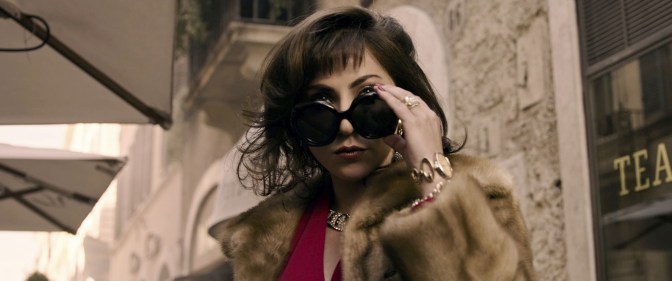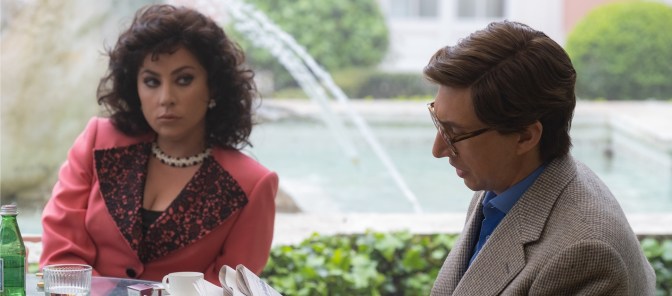The plot of House of Gucci is what camp dreams are made of.

Love, sex, fashion, money, tax evasion, adultery, murder: it all coalesces in the stranger-than-fiction tale of the family behind the Gucci fashion house. It begins modestly: bold social butterfly Patrizia Reggiani (Lady Gaga) encounters the quiet and unassuming Maurizio Gucci (Adam Driver) at a party. The two fall in love despite his father Rodolfo’s (Jeremy Irons) objections to her lower-class status.
Eventually, the family business envelops the young couple at Patrizia’s insistence with uncle Aldo’s (Al Pacino) support. As they slip deeper into Gucci’s affairs—battling over control, protecting the brand from counterfeits, dealing with the bumbling caricature Paolo (Jared Leto)—relations between the family members sour until the only option is to, as Patrizia says, “take out the trash.”
House of Gucci is three films in one, with the principal actors anchoring each of director Ridley Scott’s disparate visions for the story. Jared Leto is the dungeon master of Gucci’s most outrageous, over-the-top tendencies. Adam Driver leads the high-minded exploration of the Gucci empire and how the family lost it all. Gaga bridges the two with her queenly balance of high camp and intense drama. Like the Guccis themselves, Scott’s three interpretations battle for control of the film, with none of them coming out on top. Instead, House of Gucci is a tonal and thematic mess that’s enjoyable when you consider its separate parts rather than the whole.

Leto’s Gucci is what the trailers promised and is easily the most fun. Scott slathers a high-glam gloss over the story’s unhinged chaos and renders the best moments with good-natured humor and irony. His scene cuts and the heavily 70s and 80s inspired soundtrack choices are on-the-nose, but in the best intentional way that earns smiles and laughter. (Paolo’s declaration of freedom like a pigeon, of all birds, and the sharp cut to his actual pigeon coop is a stroke of brilliance.)
Paolo is key to the best mess, a “triumph of mediocrity” in a sweaty, balding shell of the Guccis’ elegance. Leto looks like he’s living his best life creating this bumbling black sheep, with all of the unmerited hubris and fragile ego he can muster. Leto swings for the farcical fences but still finds moments of vulnerability – through his eyes – that win you over. It doesn’t matter that he’s often swimming opposite his castmates or that Scott could’ve cast another actor who didn’t require hours’ worth of makeup. Every time Leto is on screen is a delight.

Driver’s Gucci is where things fall apart. Instead of fully embracing the Gucci hot mess, Scott develops a self-serious drama that considers the clash of family, wealth, and ambition. The fashion house’s health drives the tension and takes up excessive narrative space. Minus a few scenes where the business troubles intersect with shifts in Maurizio and Patricia’s marriage, the Gucci drama doesn’t create enough spark, unlike what Leto does in his lane.
Driver is a compelling actor who can believably portray almost anything, and he captures Maurizio’s awkward meekness and its mutation into ruthlessness well. However, his performance is well out-of-step with the rest of the cast’s heightened energy, to the point it feels like Scott miscast him. The irony is that Driver is often the most overwhelmingly intense performer in any given film, but Scott doesn’t give him enough material that capitalizes on those strengths. It only comes through during a particularly enthusiastic love scene with Patrizia and a confrontation between the two over the Gucci counterfeits.

Lady Gaga’s Gucci tries to have it both ways, and it could’ve been successful had Scott dialed back the pretense. Gaga was born to play the role of “low-class but glamorous murderess,” and she’s as good as expected. She works well with her scene partners, meeting Driver’s simmering intensity and Leto’s outsized absurdity with her blend of calculated camp. You can see Patrizia’s wheels turning, cooking up ways to push Maurizio and herself to the top of the empire while deluding herself that it isn’t in service of her ambition. Putting her accent (and everyone else’s for that matter) aside, it is Gaga’s most compelling work to date, an affirmation of her range and her acting abilities.
Unfortunately, Gaga does that work alone, as Scott doesn’t give her character a clear direction or motivation. The film doesn’t settle whether Patrizia pursued Maurizio because she was attracted to him or his name. Patricia and Maurizio’s awkwardly charming courtship and early marriage suggests one thing but is undercut by the constant challenges to her claim and her ensuing frustration. It’s possible and likely that both are true, but Scott and screenwriter Becky Johnston don’t explore the dichotomy enough to offer a satisfying answer. By the time we finally get to Patrizia’s unraveling that leads to her murder plot, Scott’s tonal whiplash and overstuffed runtime have swallowed the impact such a shocking decision should have. Scott leaves Patrizia in this narrative quagmire of shallow desperation that just isn’t fun to watch.

In between the intentional and unintentional spates of laughter, I couldn’t help imagining how a director who embraces the absurd would’ve helmed House of Gucci. It’s a project that Baz Luhrmann or Ryan Murphy (with stringent oversight) would’ve killed. Scott, a director of stylized, big-budget epics like Gladiator and mid-scale human dramas like Thelma & Louise, doesn’t immediately come to mind. There’s quite a bit of fun to have when House of Gucci works, especially when you’re amongst people with whom you can laugh along (it’s a surprisingly convincing case for the theater experience).
However, with its confused motivations and inconsistent pleasures, the film proves the impression about Scott right.

4 thoughts on “Lacking Direction Plagues ‘House of Gucci’s’ Captivating Story and Cast”